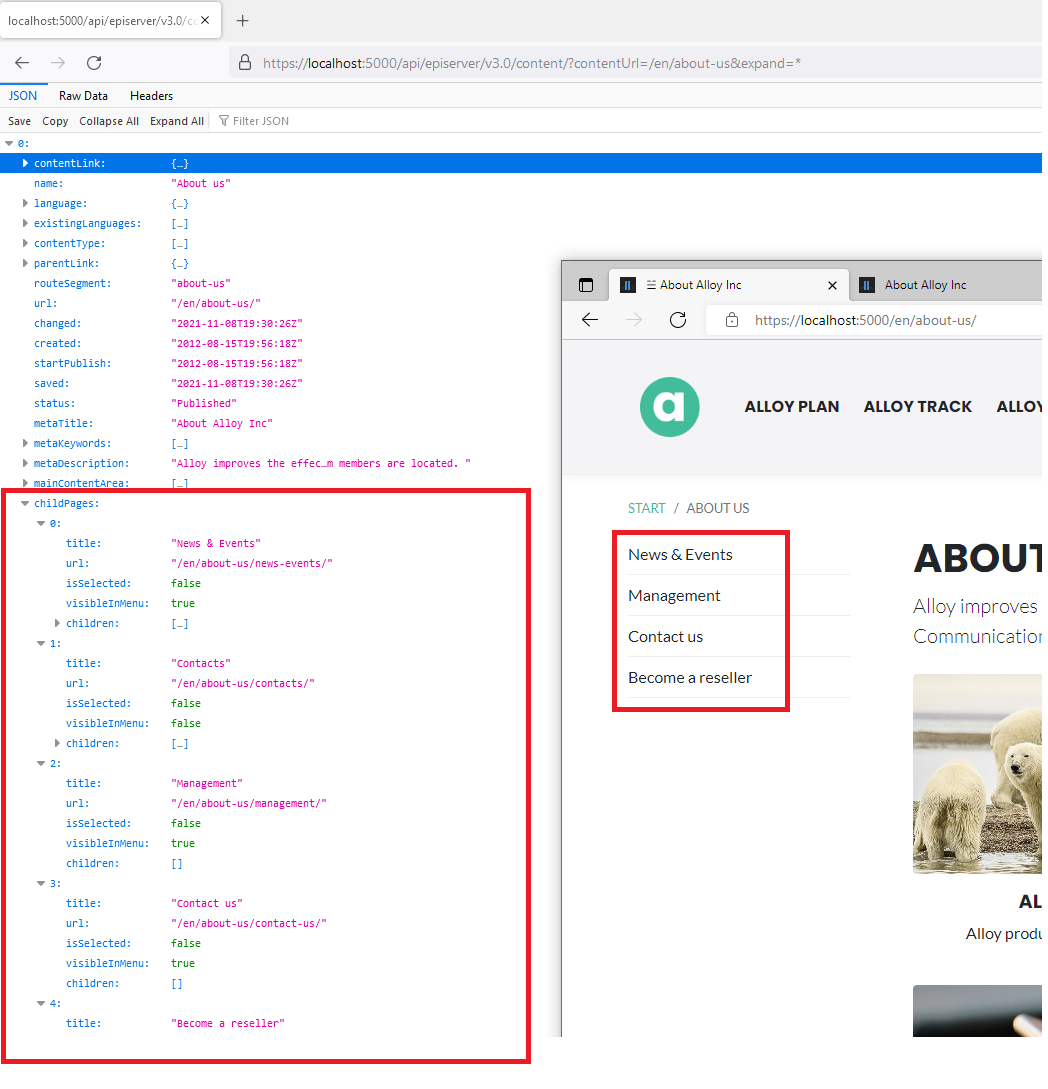Display Child Pages in Content Delivery API Response
The below example will implement an instance of IContentConverterProvider to customise the serialisation of PageData and output child pages in the Content Delivery API response. It is a very simple implementation although can be extended to fully customise the Content Delivery Response.
All code below can be found on the following GIT Repo : https://github.com/Netcel-Optimizely/Optimizely-ContentDelivery-Examples
Firstly let’s create an interface which can be implemented for specific conversion scenarios
/// <summary>
/// Content api model property convertor
/// </summary>
public interface IContentApiModelConvertor
{
/// <summary>
/// Convert content to api model
/// </summary>
/// <param name="content"></param>
/// <param name="contentApiModel"></param>
/// <param name="converterContext"></param>
void Convert(IContent content, ContentApiModel contentApiModel, ConverterContext converterContext);
}To handle the conversion, we must create our own Content Converter for this create a new class called PageContentConvertor which inherits DefaultContentConverter this already implements IContentConverter and deals with the base conversion logic.
public class PageContentConvertor : DefaultContentConverter
{
private readonly IHttpContextAccessor _httpContextAccessor;
private readonly IEnumerable<IContentApiModelConvertor> _contentApiModelConvertors;
/// <summary>
/// Initializes a new instance of the <see cref="PageContentConvertor"/> class.
/// </summary>
public PageContentConvertor()
{
}
/// <summary>
/// Initializes a new instance of the <see cref="PageContentConvertor"/> class.
/// Default page convertor
/// </summary>
/// <param name="contentTypeRepository"></param>
/// <param name="reflectionService"></param>
/// <param name="contentModelService"></param>
/// <param name="contentVersionRepository"></param>
/// <param name="contentLoaderService"></param>
/// <param name="urlResolverService"></param>
/// <param name="propertyConverterResolver"></param>
/// <param name="httpContextAccessor"></param>
/// <param name="contentApiModelConvertors"></param>
public PageContentConvertor(
IContentTypeRepository contentTypeRepository,
ReflectionService reflectionService,
IContentModelReferenceConverter contentModelService,
IContentVersionRepository contentVersionRepository,
ContentLoaderService contentLoaderService,
UrlResolverService urlResolverService,
IPropertyConverterResolver propertyConverterResolver,
IHttpContextAccessor httpContextAccessor,
IEnumerable<IContentApiModelConvertor> contentApiModelConvertors)
: base(
contentTypeRepository,
reflectionService,
contentModelService,
contentVersionRepository,
contentLoaderService,
urlResolverService,
propertyConverterResolver)
{
_httpContextAccessor = httpContextAccessor;
_contentApiModelConvertors = contentApiModelConvertors;
}
/// <summary />
/// <param name="content"></param>
/// <param name="converterContext"></param>
/// <returns></returns>
public override ContentApiModel Convert(IContent content, ConverterContext converterContext)
{
if (converterContext.ContextMode.EditOrPreview())
{
_httpContextAccessor.HttpContext.SetupVisitorGroupImpersonation(content, AccessLevel.Read);
}
var model = base.Convert(content, converterContext);
foreach (var convertor in _contentApiModelConvertors)
{
convertor.Convert(content, model, converterContext);
}
if (converterContext.Options.FlattenPropertyModel)
{
FlattenPropertyMap(model);
}
return model;
}
}Register this Class at Startup
services.AddSingleton<PageContentConvertor>();Now, let’s create our own PageContentConvertorProvider which implements IContentConverterProvider
public class PageContentConvertorProvider : IContentConverterProvider
{
private readonly PageContentConvertor _pageContentConvertor;
/// <summary>
/// Initializes a new instance of the <see cref="PageContentConvertorProvider"/> class.
/// </summary>
/// <param name="pageContentConvertor"></param>
public PageContentConvertorProvider(PageContentConvertor pageContentConvertor)
{
_pageContentConvertor = pageContentConvertor;
}
public int SortOrder => 200;
/// <summary>
/// Resolve custom page convertor
/// </summary>
/// <param name="content"></param>
/// <returns></returns>
public IContentConverter Resolve(IContent content)
{
// further enhance this to allow different supported convertors
return content is PageData ? _pageContentConvertor : null;
}
}We also register at Startup
services.TryAddEnumerable(ServiceDescriptor.Scoped<IContentApiModelConvertor, PageDataApiModelConvertor>());Finally for the actual business logic to perform the conversion we first need a Model for the Navigation Item
/// <summary>
/// Navigation Item Dto.
/// </summary>
public class NavigationItem
{
/// <summary>
/// Gets or sets navigation Title.
/// </summary>
public string Title { get; set; }
/// <summary>
/// Gets or sets navigation Url.
/// </summary>
public string Url { get; set; }
/// <summary>
/// Gets or sets a value indicating whether true if it matches the current page.
/// </summary>
public bool IsSelected { get; set; }
/// <summary>
/// Is Visibly in Menu Property Set
/// </summary>
public bool VisibleInMenu { get; set; }
public IEnumerable<NavigationItem> Children { get; set; } = Enumerable.Empty<NavigationItem>();
}We than create our Page Model Convertor which contains the business logic to output the Child Pages to Content Delivery API
/// <summary>
/// Page Data Content Convertor
/// </summary>
public class PageDataApiModelConvertor : IContentApiModelConvertor
{
private readonly IContentLoader _contentLoader;
private readonly IUrlResolver _urlResolver;
/// <summary>
/// Initializes a new instance of the <see cref="PageDataApiModelConvertor"/> class.
/// </summary>
/// <param name="contentLoader"></param>
/// <param name="urlResolver"></param>
public PageDataApiModelConvertor(IContentLoader contentLoader, IUrlResolver urlResolver)
{
_contentLoader = contentLoader;
_urlResolver = urlResolver;
}
public void Convert(IContent content, ContentApiModel contentApiModel, ConverterContext converterContext)
{
if (content is not PageData pageData)
{
return;
}
// add navigation
var navigation = new List<NavigationItem>();
var children = _contentLoader.GetChildren<PageData>(content.ContentLink);
navigation.AddRange(children.Select(x => CreateNavigationStructure(x, pageData)));
contentApiModel.Properties.Add("ChildPages", navigation);
}
private NavigationItem CreateNavigationStructure(PageData page, IContent currentContent)
{
var model = CreateNavigationItem(page, currentContent);
var children = _contentLoader.GetChildren<PageData>(page.ContentLink);
model.Children = children.Select(x => CreateNavigationStructure(x, currentContent));
return model;
}
private NavigationItem CreateNavigationItem(PageData pageContent, IContent currentContent)
{
return new NavigationItem
{
Title = pageContent.Name,
Url = _urlResolver.GetUrl(pageContent.ContentLink),
IsSelected = pageContent.ContentLink == currentContent.ContentLink,
VisibleInMenu = pageContent.VisibleInMenu,
};
}
}Register the conversion provider at Startup
services.TryAddEnumerable(ServiceDescriptor.Singleton<IContentConverterProvider, PageContentConvertorProvider>());
If all goes to plan when querying any page via the Content Delivery API the payload of the response should include the child pages.
e.g.


Comments